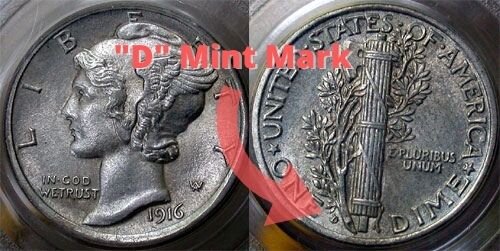Should I Clean My Old Coins Before Selling Them?
To Clean or Not to Clean - That is the Coin Question
When you stumble upon an old coin, whether it’s from a relative’s collection, a flea market find, or even unearthed while metal detecting, one question always comes up: Should I clean my old coins before selling them?
It can be tempting to want to clean a coin right away, especially if you find it in the ground from metal detecting. (Photo credit - Ace Covey)
As someone with years of experience in the coin collecting and selling world, I can tell you this is a critical decision that could greatly impact the coin’s value. Let’s dive into why that is and what to do if cleaning seems necessary.
**DISCLAIMER - As an Amazon Associate I earn from qualifying purchases. The links in the article are affiliate links that help support this blog and my channels.
Metal Detecting Life is supported by you, the readers! When you purchase something I recommend via my links, I may get an affiliate commission (terms of service) — but it never affects the price you pay. Cheers!
Should You Clean Your Coins?
The short answer is almost always NO! Cleaning old coins can reduce their value significantly. The patina, or natural tarnish, on a coin tells a story of its age and authenticity.
Removing it can make the coin look unnatural and raise red flags for potential buyers. Professional collectors and dealers often prefer coins in their original, unaltered state.
Pros and Cons of Cleaning Coins
Here’s a quick breakdown:
Pros:
Enhances the appearance of modern or common coins.
Removes dirt or debris for better identification.
May increase appeal for decorative purposes.
Cons:
Reduces numismatic (collector) value.
Causes scratches or damage to the coin surface.
May lead to rejection from serious buyers or dealers.
Many coin collectors who don’t mind lightly cleaning their less rare/non valuable coins recommend using a set of Andre’s Pencils. When used carefully, they can really assist in bringing back a coin’s detail and making them great to display again!
Andre Pencils
Coin and Relic cleaning set to assist in lightly removing debris and crusted dirt.
How to Safely Clean a Coin (If You Must)
If you absolutely must clean a coin, here’s what I recommend:
Use Warm Water: Gently rinse the coin under warm running water to remove loose dirt.
Mild Soap: If necessary, add a drop of mild dish soap to the water. Avoid harsh chemicals.
Soft Cloth or Brush: Use a microfiber cloth or a very soft-bristled toothbrush to lightly clean the surface. Never scrub.
Pat Dry: Use a soft cloth to gently pat the coin dry. Don’t rub it.
Here are a few examples of coins that I found on a recent metal detecting trip that when freshly dug, had dirt caked and stuck over their details. With just a light toothbrush and a little bit of soap, I was able to gently remove the natural debris to help reveal the coins’ details while still leaving their patina.
Even with these methods, remember that cleaning should only be done if the dirt obscures key details that you wish to help display, and the coin is not highly valuable or rare as even these techniques may damage it.
Why Olive Oil Isn’t Ideal for Coins
Using olive oil on an old coin might seem like a good idea for preservation, but it's not recommended by most professional coin collectors or dealers. Here’s why:
Residue Build-Up: Olive oil can leave a sticky residue on the coin that attracts dust and dirt over time, potentially leading to more damage.
Acidity: Over time, the natural acids in olive oil can react with the coin's metal, causing discoloration or corrosion.
Hard to Remove: Once applied, olive oil can seep into tiny crevices and be difficult to clean off completely, especially from intricate designs.
If a Coin Needs Cleaning or Treatment
If preservation or cleaning is necessary, consult a professional coin conservator. They use methods designed to protect the coin’s integrity while removing harmful substances.
In short, while olive oil might seem like a gentle option, it’s not worth the risks to the coin's condition or value. Instead, focus on proper storage and handling to keep your coin safe for years to come.
Best Practices for Coin Preservation
If you want to preserve an old coin, here are safer alternatives:
Use a Coin Holder: Store the coin in an acid-free holder or a specialized coin flip to protect it from handling and environmental factors.
Avoid Direct Contact: Always handle coins by the edges to prevent fingerprints or oils from your skin from transferring to the surface.
Proper Storage: Keep the coin in a cool, dry place, away from humidity and extreme temperatures.
Coin Capsules
Protect and display your prized coin collection with an assortment of coin capsules.
Why Old Coins Have Value
Old coins are more than just currency; they’re pieces of history. Their value often comes from a combination of their rarity, historical significance, condition, and the material they’re made of. For example:
Silver Dollars: Coins like the Morgan or Peace dollars are popular for their silver content and historical charm.
Indian Head Pennies: These coins, minted from 1859 to 1909, are sought after by collectors for their unique design and limited mintage.
Double Eagle Gold Coins: These high-value coins were minted in the late 1800s and early 1900s and contain significant amounts of gold.
Other coins like the 1909-S VDB Lincoln cent, the 1916D Mercury dime, or an 1870S Seated Liberty silver dollar coin are all prime examples of high-value items compared to their actual face value.
This 1870S Seated Liberty dollar coin sold for over $1 million dollars at auction! (Photo credit - Ace Covey)
These coins represent a mix of rarity, historical significance, and aesthetic appeal. Collectors are drawn to coins with minimal wear and tear, as their condition is a major factor in determining value and that drive collectors to pay top dollar.
Characteristics That Determine a Coin’s Value
Several factors influence the worth of a coin, including:
Rarity: How many were minted, and how many still exist?
Condition: Coins graded by professionals on scales like MS (Mint State) or AU (Almost Uncirculated) fetch higher prices.
Demand: Coins sought after by collectors will always carry higher values.
Historical and Cultural Importance: Does the coin signify a significant historical moment?
Metal Content: Coins made of gold, silver, or other precious metals can have intrinsic value.
Where to Sell Old Coins
You can often make much more than face value for your old coins if you know where to sell them. (Photo credit - Alexander Grey, Unsplash)
Selling old coins can be a rewarding decision for several reasons. For one, it’s an opportunity to turn forgotten treasures into cash, especially if the coins are rare, historically significant, or made of precious metals like gold or silver.
Coin collectors and enthusiasts are always on the lookout for unique pieces to add to their collections, and your coins might hold more value than you realize. Whether you’re downsizing, funding a project, or simply curious about their worth, selling coins allows you to share a piece of history with someone who will appreciate it while maximizing their financial potential.
There are several avenues to sell old coins:
Coin Dealers: Local shops often buy and appraise coins.
Online Platforms: Sites like eBay or dedicated coin marketplaces can connect you with collectors worldwide.
Coin Shows: These events are great for networking and selling to dedicated collectors.
Auction Houses: For high-value coins, professional auctions can help you get the best price.
What to Do if You Think a Coin is Valuable
If you come across an old coin and believe it might be valuable, here’s what I recommend:
Do Not Clean It: Keep the coin in its found condition.
Handle with Care: Hold the coin by its edges to avoid adding fingerprints or oils.
Research Its History: Use online resources, coin guides, or forums to identify the coin.
Get a Professional Appraisal: Visit a trusted coin dealer or submit it to a professional grading service like PCGS or NGC.
Store It Properly: Use protective coin holders to prevent further wear or damage.
Determining Your Coins Value Using The Official Red Book
Red Book gives you information regarding each coin, mintage, grading criteria, and even various known errors along with current values of each coin. (Photo credit: Ace Covey)
A guidebook like The Official Red Book of Coins is an invaluable resource for determining the value of a coin because it provides a wealth of reliable and well-researched information in one place. Here’s why it’s a must-have for collectors:
1. Comprehensive Coin Listings
The Red Book covers a wide range of U.S. coins, from early colonial issues to modern-day releases. This makes it an excellent starting point for identifying and valuing nearly any coin you come across.
2. Historical Context
It includes information about each coin's history, mintage, and any special details, such as errors or variations, which can significantly impact value. Understanding a coin’s background is crucial for assessing its desirability among collectors.
3. Detailed Grading Guidelines
The book provides clear descriptions and visual aids for grading coins, helping you determine their condition (e.g., Good, Fine, Mint State). Since condition is a major factor in a coin’s value, this guidance is essential.
4. Estimated Values
While the market fluctuates, the Red Book provides baseline retail values for coins based on their grade and rarity. These values give you a solid starting point for understanding a coin’s potential worth.
5. Mint Mark Identification
Identifying where a coin was minted is key to determining rarity and value. The Red Book includes information about mint marks, their locations on each coin, and their significance, making it easier to assess your coin accurately.
6. Error Coins and Special Issues
Collectors love error coins, proofs, and limited editions. The Red Book highlights these, helping you spot potentially valuable coins that might otherwise go unnoticed. Below is a list of just some of the things to keep an eye out for when searching coins for errors.
7. Educational Value
For beginners and experienced collectors alike, the Red Book is more than just a price guide—it’s an educational tool that deepens your understanding of coin collecting as a hobby or investment.
Why Trust the Red Book?
The Red Book has been published annually since 1946, and its reputation as a trusted resource comes from decades of accurate information curated by leading numismatic experts. It’s a standard reference in the coin-collecting world, making it a go-to guide for both hobbyists and professionals.
In summary, The Official Red Book of Coins is more than just a price guide—it’s a treasure trove of knowledge that helps collectors identify, understand, and properly value their coins with confidence.
Final Thoughts
Cleaning old coins is often a risky move that can do more harm than good. When in doubt, leave the coin as is and seek professional advice.
Coin collecting can be both fun and rewarding regardless if they are clean or not. (Photo credit - Yuri Krupenin, Unsplash)
Coins are pieces of history, and they deserve respect and care. By taking the right steps, you can ensure you get the most out of your discovery—whether you choose to keep it as part of a collection or sell it to a collector who will treasure it just as much as you do.
Collecting and selling coins can be a rewarding experience—but preserving their history and authenticity is key to maximizing their value.
Happy collecting!
“So go out there and remember to “Swing4TheRing!””




















